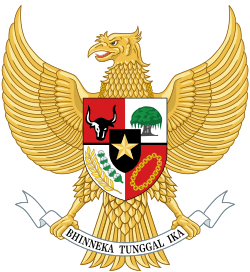Emergency Government of the Republic of Indonesia
| Emergency Government of the Republic of Indonesia | ||||||||||
| Pemerintahan Darurat Republik Indonesia | ||||||||||
| Government in exile | ||||||||||
| ||||||||||
| Capital | Djokdjakarta (symbolic) | |||||||||
| Capital-in-exile | Bukittinggi | |||||||||
| Languages | Indonesian | |||||||||
| Government | Provisional government | |||||||||
| Leader | Syafruddin Prawiranegara | |||||||||
| Historical era | Indonesian National Revolution | |||||||||
| • | Operation Kraai | 19 December 1948 | ||||||||
| • | Established | 22 December 1948 | ||||||||
| • | Disestablished | 13 July 1949 | ||||||||
| ||||||||||
The Emergency Government of the Republic of Indonesia (Indonesian: Pemerintahan Darurat Republik Indonesia), (PDRI) was established by Indonesian Republicans after the Netherlands occupied Yogyakarta in Central Java the location of the temporary Republican capital. It was located in the city of Bukittinggi and led by Sjafruddin Prawiranegara.[1]
The Republic of Indonesia’s Strategy Council had prepared an emergency plan to create a "government in exile" in Sumatra or overseas. Mr Sjafruddin Prawiranegara, the Minister of Welfare went to Bukittinggi, West Sumatra in preparation for this emergency plan. Before being captured by the Dutch, President Sukarno sent a telegraph message to Mr. Sjafruddin Prawiranegara in Bukittinggi giving him a mandate to create a "Republic of Indonesia government in exile" but this was not received until 1949. A similar telegraph was sent to Mr. Maramis, Indonesian Minister of Finance in New Delhi, India. Based on the emergency plan, after the Dutch invasion, on December 22, 1948, Mr. Sjafruddin Prawiranegara established a 'government in exile' called the 'Emergency Government of the Republic of Indonesia' (PDRI) in Bukittinggi, Sumatra. Sjafruddin served as chairman of the emergency cabinet. The leaders of the PDRI moved around West Sumatra in an effort to evade arrest by the Dutch who wanted to abolish the PDRI. In 1949 the PDRI government contacted the leaders of Indonesian forces in Java and the six Republic of Indonesia government ministers in Java who had escaped arrest.
Based on the Roem-Royen peace agreement, on July 13, 1949, Dutch troops were to be pulled out from Republic of Indonesia regions and the Republic of Indonesia leaders were to be freed. The PDRI would therefore no longer be required, and Mr. Sjafruddin Prawiranegara disbanded the PDRI and returned the mandate to the President of RI.
See also
References
- ↑ Jacques Bertrand (2004). Nationalism and Ethnic Conflict in Indonesia. Cambridge University Press. p. 166. ISBN 0-521-52441-5.



